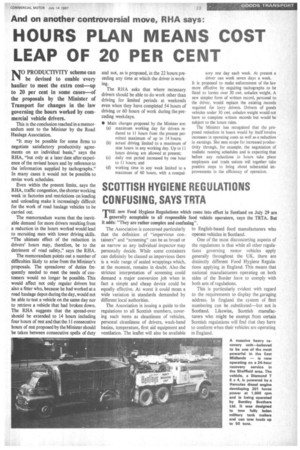HOURS PLAN MEANS COST LEAP OF 20 PER CENT
Page 25

If you've noticed an error in this article please click here to report it so we can fix it.
NO PRODUCTIVITY scheme can be devised to enable 'every haulier to meet the extra cost—up to 20 per cent in some cases—of the proposals by the Minister of Transport for changes in the law governing the hours worked by com
mercial vehicle drivers.
This is the conclusion reached in a memorandum sent to the Minister by the Road Haulage Association.
"It may be possible for some firms to negotiate satisfactory productivity agreements on an individual basis," says the RHA, "but only at a later date after experience of the revised hours and by reference to the information supplied by tachographs." In many cases it would not be possible to revise work schedules.
Even within the present limits, says the RHA, traffic congestion, the shorter working week in factories and restrictions on loading and unloading make it increasingly difficult for the work of road haulage vehicles to be carried out.
The memorandum warns that the inevitable demand for more drivers resulting from a reduction in the hours worked would lead to recruiting men with lower driving skills. "The ultimate effect of the reduction in drivers' hours may, therefore, be to the detriment of road safety," says the RHA.
The memorandum points out a number of difficulties likely to arise from the Minister's proposals. The spreadover of duties frequently needed to meet the needs of customers would no longer be possible. This would affect not only regular drivers but also a fitter who, because he had worked at a road haulage depot during the day, would not be able to test a vehicle on the same day nor to retrieve a vehicle that had broken down. The RHA suggests that the spread-over should be extended to 14 hours including four hours of rest and that the 11 consecutive hours of rest proposed by the Minister should be taken between consecutive spells of duty and not, as is proposed, in the 22 hours preceding any time at which the driver is working.
The RHA asks that where necessary drivers should be able to do work other than driving for limited periods at weekends even when they have completed 54 hours of driving or 60 hours of work during the preceding weekdays.
• Main changes proposed by the Minister are: (a) maximum working day for drivers reduced to 11 hours from the present permitted maximum of up to 14 hours; (b) actual driving limited to a maximum of nine hours in any working day. Up to 11 hours driving are allowed at present; (c) daily rest period increased by one hour to 11 hours; and (d) working time in any week limited to a maximum of 60 hours, with a compul sory rest day each week. At present a driver can work seven days a week.
It is proposed to make enforcement of the law more effective by requiring tachographs to be fitted to lorries over 30 cwt. unladen weight. A new simpler form of written record, personal to the driver, would replace the existing records required for lorry drivers. Drivers of goods vehicles under 30 cwt. unladen weight would not have to complete written records but would be subject to the hours rules.
The Minister has recognized that the proposed reduction in hours would by itself involve increases in operating costs as well as a reduction in earnings. She sees scope for increased productivity through, for example, the negotiation of realistic running schedules and is expecting that before any reductions in hours take place employers and trade unions will together take positive steps to bring about substantial improvements in the efficiency of operation.


























































































































